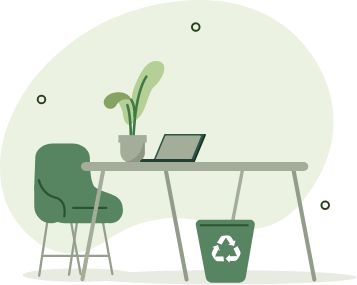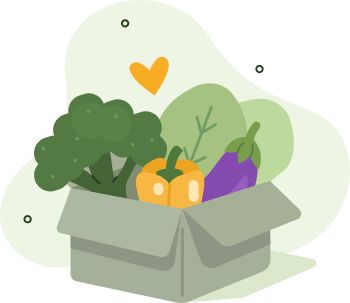Be Part of the Change
It’s no secret that large-scale systems change is what’s needed for environmental and climate action. But that does not mean that our collective individual commitment and action are not important!
Find sustainable swaps and options to incorporate into your life that make sense for you and make a positive impact. There are many ways to get involved, make a difference, and be part of the change – just choose a topic and begin today!
Small, consistent changes in your daily routine
can make a world of difference.
Be a Part of Fighting Climate Change

Sustainable Residence Hall Living
There are many built-in ways to practice sustainable behaviors while living in Centennial Hall, a LEED Gold building! Be sure to attend events held by the EcoReps, peer-to-peer sustainability educators living in Centennial Hall, to learn even more about how to be sustainable in general and within Centennial Hall! Take a peek below at some of the ways you can incorporate sustainability while living in Centennial Hall.
- The average dorm room consumes 30% of all electrical energy used while vacant! Turn off and unplug devices when not in use.
- Keep your curtains or blinds open in the winter and closed during warmer times.
- If your heat or AC is running, make sure the windows are closed.
- Take shorter, cooler showers.
- Use task lighting, with LED bulbs, rather than overhead lighting and remember to turn off lights when you leave the room!
- Wash your laundry in cold water.
- Report drafty or leaky windows to Centennial Hall staff
- Decorate and furnish your room with items that you can reuse for the rest of your time at ESF and beyond. Ask yourself “How much use/enjoyment will I really get out of this” before making a purchase.
- Audit your trash, recycling and compost! Understand what you use and discard so you can make a plan to reduce and replace single use items with durable alternatives. (Ex: swap paper towels for microfiber cloths or rags made from old clothes.)
- Borrow or thrift as much as you can.
- Gift experiences, rather than things.
- Gather some friends and buy in bulk. If you are able, buy fresh, minimally processed food to cut back on packaging.
- Bring your own reusable container for leftovers when going out to eat.
- Organize food in your fridge by making an “eat first” space. Prioritize leftovers, food close to its expiration date, and opened items that you may otherwise not see.
- Request a free menstrual cup or reusable pad set from the Office of Sustainability
- Keep a set of real dishes on hand and bring them to dorm and campus events. ESF has a strong “Lug Your Mug and Pack Your Plate” culture, so you won’t be alone!
- Say no to freebies and giveaway items that you know you won’t use long term. If you feel up to it, kindly suggest some more sustainable alternatives to the event organizers.
- Centro buses operate in the Syracuse area and schedules can be found online. They also offer a Trip Planner and Bus Tracker.
- The Connective Corridor Bus is a free loop bus service between University Hill and downtown Syracuse.
- Syracuse University also offers campus shuttles with pre-determined loops, on demand shuttle services that will take students to locations near campus (ex: Syracuse Hancock Airport and the Regional Transportation Center) and safety escort services (both walking and shuttle). Learn more about these services by visiting SU’s campus shuttle website.
- ESF has a bike library program! Five bicycles are located outside of Moon Library and are available to rent for 24 hours at a time. Membership to ESF students is free and bikes are rented from Moon Library with the swipe of an ESF ID card. Visit Moon Library to complete forms and view a short (10-15 minute) safety presentation.

Living Sustainability Off-Campus
Taking the step to live off-campus allows for more opportunities to incorporate sustainable practices into your life. Check out the resources below for ideas and resources to live more sustainably, off-campus (student, staff, or faculty!
Depending on your living arrangement, you may or may not be able to have a backyard compost pile. This does not mean that you cannot compost though, you still have options!
- You can purchase a self-contained composting bin to make small amounts of compost to use in a garden or on plants.
- Vermicomposting is a compost system which uses worms to break down organic material to create compost. Vermicomposting usually creates soil that is more nutritious than traditional composting for growing gardens and other crops.
- Check with your local municipality to see if they offer curbside composting or if
they have a drop-off service
- If you live in Onondaga county, check out OCRRA’s compost drop-off program
Sustainable eating is going to look different for everyone, there is no one size fits all solution. Depending on dietary restrictions, culture, or preferences, everyone is going to have a different definition of eating sustainably.
- Shop locally, in bulk, and in season. Some options in the Syracuse area include: the Syracuse Cooperative Market (two locations: Westcott and Salt City Market), CNY Regional Farmers Market, and Green Planet Grocer.
- Decrease your meat consumption and opt for a more plant-based diet.
- Lessen your amount of food waste by: storing food properly, only purchasing what you know you’ll be able to eat before it goes bad, learn how to cook/use food scraps, meal prep and eat leftovers, and preserve food nearing the end of its life in the freezer.
Many, if not all, of the same public transportation options exist for ESF students, staff, and faculty living off-campus.
- Centro buses operate in the Syracuse area and schedules can be found online. They also offer a Trip Planner and Bus Tracker.
- The Connective Corridor Bus is a free loop bus service between University Hill and downtown Syracuse.
- Veo is a point-to-point micromobility share program available to Syracuse residents to get around using electric transportation.
- The City of Syracuse has a bicycle network, as well as a Syracuse Bicycle Plan 2040, which outlines how the city can expand its current system.

Sustainable Snack Swaps
Everyone loves snacks! At ESF, we love sustainable snacks the most. In general, foods with one or more of the following attributes are considered to be more sustainable:
- Zero or low waste packaging
- Certified or labelled for sustainable agriculture - including, but not limited to USDA Organic, Food Alliance Certified, Rainforest Alliance Certified, Fair Trade Certified, Certified B Corporation
- Locally sourced
- Un- or minimally processed
Reuse Resources

![Recycle Right New York [logo]](/sustainability/assets/logo-recyclerightny.jpg)
![CSMM: Center for Sustainable Materials Management [logo]](/sustainability/assets/logo-csmm.jpg)